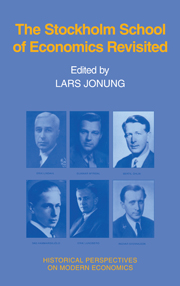Book contents
- Frontmatter
- Dedication
- Contents
- Preface
- List of Contributors
- Dramatis Personae at the end of 1937
- Introduction and Summary
- Part I The roots
- Part II The approach of the Stockholm School
- 4 Expectation and plan: The microeconomics of the Stockholm School
- 5 Sequence analysis and optimization
- 6 There were two Stockholm Schools
- 7 On formal dynamics: From Lundberg to chaos analysis
- 8 Lundberg, Keynes, and the riddles of a general theory
- 9 Macrodynamics and the Stockholm School
- 10 Ohlin and the General Theory
- 11 The monetary economics of the Stockholm School
- 12 The Austrians and the Stockholm School: Two failures in the development of modern macroeconomics?
- 13 The political arithmetics of the Stockholm School
- Comment
- 14 After the Stockholm School
- Part III The impact of the Stockholm School
- Part IV What remains of the Stockholm School?
- The Stockholm School: A non-Swedish bibliography
Comment
Published online by Cambridge University Press: 05 July 2013
- Frontmatter
- Dedication
- Contents
- Preface
- List of Contributors
- Dramatis Personae at the end of 1937
- Introduction and Summary
- Part I The roots
- Part II The approach of the Stockholm School
- 4 Expectation and plan: The microeconomics of the Stockholm School
- 5 Sequence analysis and optimization
- 6 There were two Stockholm Schools
- 7 On formal dynamics: From Lundberg to chaos analysis
- 8 Lundberg, Keynes, and the riddles of a general theory
- 9 Macrodynamics and the Stockholm School
- 10 Ohlin and the General Theory
- 11 The monetary economics of the Stockholm School
- 12 The Austrians and the Stockholm School: Two failures in the development of modern macroeconomics?
- 13 The political arithmetics of the Stockholm School
- Comment
- 14 After the Stockholm School
- Part III The impact of the Stockholm School
- Part IV What remains of the Stockholm School?
- The Stockholm School: A non-Swedish bibliography
Summary
My first reflection will be methodological. I have devoted some time to reading the social philosopher Michel Foucault because some social scientist friends of mine insisted on his relevance for an understanding of social history. Foucault left me with a feeling that different aspects of an epoch are linked together and that a change of epochs has many causal dimensions that are best understood together. I felt that I was looking at patterns in history from a new perspective.
In a way, Kumara Velupillai's article reminds me of this reading of Foucault. Scientific discoveries have historic roots that linger on and develop, as well as appearing as urgent questions for a particular period. Roots from Petty and Malthus together with questions of “justice in taxation” form a picture “painted” by Velupillai. It takes a supreme intellect to propose these grand links and thereby present his reader with a broad understanding.
However, there exists a problem for me as a reader. As with Foucault, the closely argued proofs are missing. They are not part of the method. I only intuitively feel that Velupillai is right. One has to rely on the author's judgment. However, I do believe that Velupillai is far more accurate than wrong in his reconstruction of developments in economics.
I will now proceed to a more detailed remark that ends up, as I see it, at a “transcendent” level. Velupillai quotes Sir John Hicks saying that Lindahl was the founder of social accounting theory. The important concepts of ex ante-ex post used by the Stockholm School naturally provide an example of a link to accounting.
- Type
- Chapter
- Information
- The Stockholm School of Economics Revisited , pp. 345 - 346Publisher: Cambridge University PressPrint publication year: 1991



